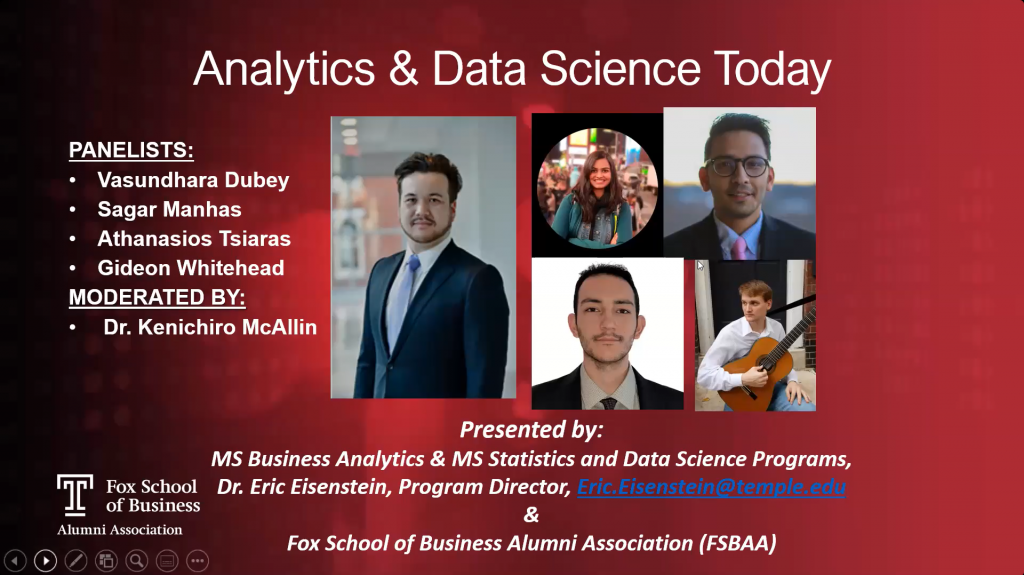In October 2021, alumni from the Fox School’s MS in Business Analytics (MSBA) program pulled back the curtain in the fields of data science and business analytics.
Four panelists answered questions about how they take the skills learned in the MSBA program and apply them in their everyday work.
Panelists included Vasundhara Dubey, MSBA ’19 and program manager at Amazon; Sagar Manhas, MSBA ’18 and interface data expert at BlackRock; Athanasios Tsiaras, MSBA ’19 and data scientist at Incelligent, a machine learning company based in Athens, Greece; and Gideon Whitehead, MSBA ’18 and software engineer at the Penn Medicine Center for Health Care Innovation. Kenichiro McAlinn, assistant professor of statistical science, moderated the panel.
Q: What is the difference between data science and business analytics?
Whitehead: Both data science and business analytics really are about taking data and converting it into information so that you can make decisions, hopefully, better decisions, than you would have made without it.
While I think that the two fields are emerging in many ways, ultimately, data science is generally more heavy on statistics and machine learning. Whereas business analytics relies heavily on situational awareness, understanding business problems.
Q: What makes a good data analyst versus a data scientist? What are the key skills, experience or credentials needed for both?
Manhas: As a data analyst, you need to have the basic technical skill set, like SEO, Python or the language that you’re going to be working in.
As a data scientist, you need to have more advanced knowledge. The expectation for a data scientist is higher. Companies require you to be technically strong. In interviews, they will (likely) have a technical round, where you will have to make your code on the spot, to make sure that you know SQL and Python.
For an analyst, they expect you to know the basics but they will if you are willing to learn. If you don’t know, they will train you on the job.
Q: What programming and business intelligence (BI) tools have you found instrumental in analytics work?
Dubey: One of the biggest expectations from me as a program manager was my data skills. It involves heavy SQL query and data infrastructure.
The second part that was important was visualization. (Professor) Josh Tapley’s data visualization class built a great foundation. I could pull data myself, present and create dashboards and reports for the leadership.
I also have to use a lot of statistical concepts that I learned in (Professor) Lauren Burns’ class to build logic behind these things. So I think statistics, SQL and visualization are three of the most majorly used things that I have learned in the MSBA program and I leverage heavily in my work.
McAlinn: I always say, I think Python will pay dividends in the future.
Q: What is the importance of soft skills?
Whitehead: I was just talking to a guitar student of mine earlier today about this. So much of what you learn in music is about soft skills: how do you present yourself, how do you communicate. You have to have the technical know-how to be able to accomplish something and have it accurate, but I think it is relatively easy to achieve that basic technical knowledge.
But whatever it is that you discover in your analysis – if you can’t communicate it, nobody’s going to listen, and even if they do, they’re not going to do what you say. They’re not going to follow any recommendation that you might make. You have to be able to convince them with clarity of thought.
Q: The data science world is quickly moving. There are new tools, methods and programs popping up every day. How do you keep your skillset sharp?
Tsiaras: I stay connected by reading websites like Medium, Towards Data Science, KDnuggets or my LinkedIn community.
However, the fact that all these cool new things are out there doesn’t mean that you have to use them. They’re all tools. Being aware is one thing, but then what fits your work is a different thing. You know your domain.
McAlinn: You need to learn, and you need to know how to learn. Once you know how to learn, learning new things is just reading a paper, observing and implementing it.
Q: What’s the application of data analysis and data science skill sets in other job functions within a company?
Dubey: You can use statistics in your company by building these performance numbers, tracking them and setting your own goals even in a non-data science function. As a program manager, I’m always asking to throw in statistics. It really makes you different from a lot of other people who would be doing the same operational job but not be using math so heavily. It makes you stand apart, makes your analysis more impactful if you’re able to translate numbers well.
Q: What advice do you have for getting a summer internship?
Manhas: I started connecting with people on LinkedIn on day one. When you start connecting with people, you start talking to people. Then you tend to understand what exactly that particular company is looking for in a business analyst, what are the key skill sets that you need to develop and enhance over the period of time so that you are capable when you reach towards your summer internship
Tsiaras: Yes, shout out to CSPD (Center for Student Professional Development), I went there and had an amazing response.
Visit the FSBAA LinkedIn Group and Fox Analytics & Data Science LinkedIn Group to connect with other Fox alumni.
